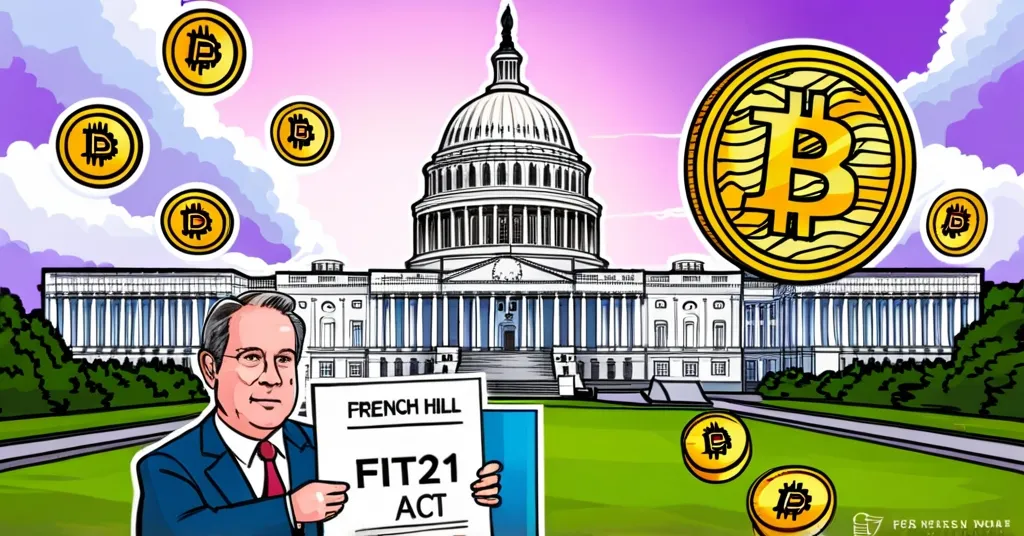U.S. Congress Eyes Pro-Crypto Legislation by 2025: Focus on Stablecoins and FIT21 Act

U.S. Congress Sets Its Sights on Crypto Legislation in 2025: The Push for Stablecoins and the FIT21 Act
In 2025, the U.S. Congress is poised to prioritize cryptocurrency legislation, focusing on pivotal areas like stablecoins and the FIT21 Act. Under a likely pro-crypto administration led by Trump, this legislative push could redefine the digital asset landscape. Leading the charge is Rep. French Hill, who will spearhead these efforts as part of the House Financial Services Committee.
- Pro-crypto administration under Trump expected to drive crypto legislation.
- Rep. French Hill to lead efforts on crypto regulation in the House.
- FIT21 Act aims to clarify the classification of digital assets.
- Stablecoin legislation intended to ensure consumer protection.
- Strategic Bitcoin reserve faces hurdles without bipartisan support.
The FIT21 Act: Defining Digital Assets
The FIT21 Act stands at the forefront of Congress’s crypto agenda. Its primary goal is to establish a regulatory framework for digital assets, clarifying whether they should be regarded as securities or commodities. By doing so, it could potentially grant the Commodity Futures Trading Commission (CFTC) increased oversight over digital commodities like Bitcoin. Rep. French Hill has emphasized the urgency of this act:
“Should FIT21 and stablecoin legislation not pass during the lame duck, both bills will be a top priority for me in the 119th Congress.”
Stablecoins: Navigating Regulatory Waters
Stablecoin legislation is another critical focus, aiming to provide regulatory clarity and enhance consumer protection. These digital currencies, pegged to stable assets like fiat currencies, have gained significant traction but also scrutiny due to concerns over market stability and security. The proposed regulations seek to bolster trust and legitimacy in this burgeoning sector.
The Strategic Bitcoin Reserve: A Bold Proposal
Amid these legislative efforts, the concept of a strategic Bitcoin reserve has surfaced, suggesting that the U.S. Treasury could acquire 1 million bitcoins. This ambitious proposal, however, faces substantial challenges, including a lack of bipartisan support and the absence of a Senate companion bill. The initiative draws parallels to historic economic strategies but requires a consensus to gain traction.
Despite these legislative ambitions, the journey to enacting comprehensive crypto laws is fraught with challenges. Competing priorities for legislative time present significant hurdles, as Congress balances various national issues. While the Trump administration is anticipated to adopt a more favorable approach towards the crypto industry, political divisions persist, complicating progress.
Industry experts like Kristin Smith, CEO of the Blockchain Association, and Ripple’s Stuart Alderoty are optimistic about a more conducive regulatory environment. Dennis Porter from the Satoshi Action Fund also underscores the potential for bipartisan collaboration to overcome political divides.
The potential impact of these legislative endeavors on the financial landscape is profound. The strategic Bitcoin reserve, akin to historical economic maneuvers, could serve as a “crypto reset,” positioning the U.S. in alignment with global digital asset trends.
Key Takeaways and Questions
What is the focus of the U.S. Congress in 2025 regarding crypto legislation?
The focus is on stablecoins and the FIT21 Act, alongside broader regulatory clarity in the crypto space.
Who is leading the charge in the House for crypto-focused legislation?
Rep. French Hill is leading efforts, chairing the committee’s digital asset panel.
What is the FIT21 Act, and what does it aim to achieve?
It seeks to establish a regulatory framework for digital assets, clarifying if they are securities or commodities, and may empower the CFTC.
What challenges could the proposed strategic Bitcoin reserve face?
Challenges include a lack of bipartisan support and no Senate companion for the proposal.
How might competing legislative priorities impact crypto-related bills?
Fierce competition for legislative time could delay or diminish the focus on crypto bills amidst other national issues.
As Congress prepares to navigate these complex issues, the outcomes of these legislative efforts will be pivotal for the crypto industry, potentially reshaping the future of digital finance in the United States.



